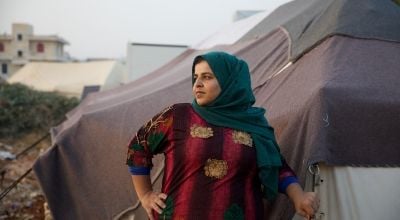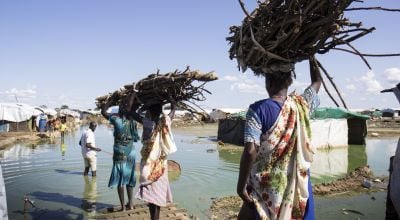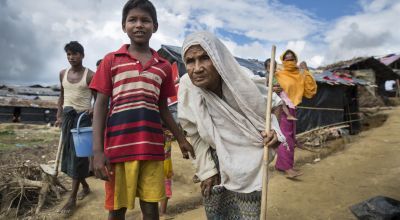
Read our 2023 annual report

Knowledge Hub
In 2022, we exceeded 30 million refugees around the world. In 2023, conditions have not improved. Based on UNHCR data, here are the 10 largest refugee crises and situations to follow in 2024.
In the past decade, the global refugee crisis has more than doubled in scope. In 2022, the UNHCR announced that we had surpassed the 100 million mark for total displacement, meaning that over 1.2% of the global population have been forced to leave their homes. As of mid-2023, that also includes 30.51 million refugees. Over half of those refugees come from just three countries. These numbers are high — almost beyond comprehension — but each one represents a person who has been forced to leave everything behind due to circumstances beyond their control.
Before we look at the world’s largest refugee crises in 2023, a quick note that we’re focusing specifically on refugees and counting them by country of origin for this listing. For more on that distinction, check out our breakdown of refugees versus IDPs — and all of the other classifications for forced migration.
10. Eritrea
As of mid-2023, over 537,000 Eritreans — nearly 15% of the country’s population — have been displaced abroad due to ongoing violence and political instability. This represents an increase of approximately 36,000 people compared to 2022.
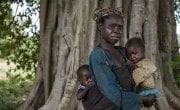
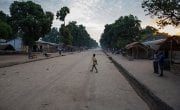
9. Central African Republic
For more than a decade, a humanitarian crisis has raged in Central African Republic. It’s gone largely unnoticed in mainstream western media; however over 750,000 Central Africans were registered as refugees in 2023 — with thousands more displaced internally.
This escalation in violence (which has been ongoing since CAR gained independence from France in 1960) has made it increasingly dangerous for Central Africans to live in the country.
8. Somalia
In recent years, the number of Somali refugees around the world had been in decline, registering as less than 800,000 last year. Unfortunately, Somalia’s protracted cycle of crisis has once again led to an increase in refugees with over 814,000 as of mid-2023.
The situation is dire for many, who are forced to contend with drought, conflict, and hunger. Last year and earlier this year, the country was at the epicentre of the current Horn of Africa crisis and facing famine-like conditions. While rains have broken the drought, the recovery from this crisis will not be swift.
Concern has been in Somalia for over 35 years, as well as neighbouring countries that serve as some of the largest host communities to Somali refugees. One key programme that we run for both refugees and internally-displaced Somalis is our Cash Consortium, giving people the autonomy and dignity of being able to prioritise their own financial needs with cash transfers. We’ve distributed more than $16 million (€14.5 million) to over 300,000 people since the launch of the programme.
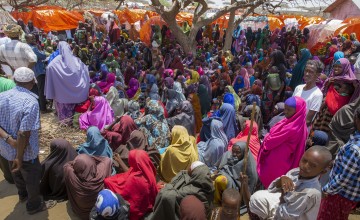
7. Democratic Republic of Congo
The Democratic Republic of Congo remains one of the world’s largest “forgotten” humanitarian crises, with events in a protracted situation rarely making headlines. Combining refugees and IDPs, its displacement numbers are the highest in Africa, with 6.1 million people displaced. This figure includes 1 million refugees seeking asylum outside DRC. In tandem with this, the DRC is also a large host community for refugees from neighbouring countries.
Concern has been responding to the DRC crisis for nearly 30 years, with emergency response among our top priorities. We are currently receiving funding from Fonds Humanitaire, managed by OCHA
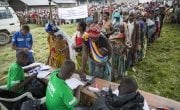

6. Sudan
Conditions in Sudan have deteriorated throughout 2023 as the country faces some of the worst violence in decades. At the end of 2022, approximately 844,000 refugees around the world were Sudanese. As of mid-2023, that number exceeded 1.02 million, and showed no signs of abating.
Concern has been in Sudan for 35 years and is currently responding to the escalated crisis in both Sudan and neighbouring Chad (where many Sudanese have been fleeing).
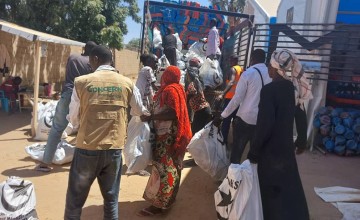
5. Bangladesh
Beginning in August 2017, over 1 million stateless Rohingya fled ongoing violence in Myanmar’s Rakhine State. Many are still living in the world’s largest refugee camp, located in nearby Cox’s Bazar, Bangladesh. The Rohingya represent the majority of the 1.26 million refugees displaced from Myanmar over the last six years.
Together with UN agencies, over 130 local, national, and international nonprofits (including Concern) have supported the Government of Bangladesh to adjust to this increase in capacity. Safety and security remain serious concerns for the Rohingya living in Cox's Bazar, where their informal housing is often destroyed in seasonal floods and fires.
4. South Sudan
The world’s youngest nation is also the site of one of its largest refugee crises, one that entered its tenth year last month. Over 4 million South Sudanese have been forced from their homes, with 2.2 million of those having to leave the country entirely.
Concern has been in South Sudan since it gained independence in 2011 and works to address the ongoing humanitarian needs and the pressure generated by widespread displacement. In addition to working with internally-displaced South Sudanese (many of whom live in Protection of Civilian Sites), we also have a presence in many of the host communities for South Sudanese refugees, including Sudan, Ethiopia, Kenya, and the DRC.
3. Ukraine
In February 2022, escalated conflict in Ukraine led to a full humanitarian crisis that has displaced over 5.8 million refugees in the last two years. This is more than 13% of the country’s population, and just under 20% of the world’s global refugee population.
Concern began working in Ukraine in 2022, shortly after the beginning of the conflict. After initially working in bordering host communities like Poland and Romania, we switched operations to Ukraine itself, where we determined humanitarian need to be greatest.


2. Afghanistan
The ongoing crisis in Afghanistan has made it one of the top countries of origin for refugees. One out of every six refugees originated from this country (a dramatic increase over recent years), and over 6.1 million Afghans are internationally displaced — largely in neighbouring Pakistan and Iran. (The latest UNHCR data does not yet account for the return of thousands of Afghan refugees from Pakistan, which took place in late 2023.)
Concern has been in Afghanistan for over 20 years and recently became the UN’s chosen partner for the emergency response to displacement in the northeastern part of the country.
1. Syria
Syria continues to be the world’s largest refugee crisis as we enter 2024, representing nearly 25% of the total global refugee population. As of mid-2023, 6.49 million Syrians have sought refuge, primarily in Lebanon, Jordan, Iraq, Egypt, and Türkiye. In Lebanon, there are no formal camps, which leaves its population of over 1 million Syrians living across 2,000 communities, often in overcrowded temporary shelters.
Since 2013, Concern has responded to the crisis in Syria, both locally and within refugee communities in Türkiye and Lebanon. In 2019, we also began operating in Iraq.
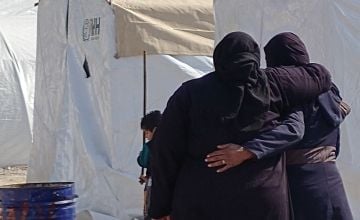
Concern's work with refugees
Concern’s response to the world’s displacement crisis is in keeping with the Comprehensive Refugee Response Framework, approved by all 193 Member States of the United Nations in September, 2016
While every emergency situation has its own unique considerations and challenges, the CRRF gives a set of guidelines for approaching the predictable aspects of these crises. This includes:
- Easing pressure on countries that welcome and host refugees
- Building self-reliance of refugees
- Expanding access to resettlement of refugees in third countries or offering other complementary pathways
- Fostering conditions that enable refugees to voluntarily return to their home countries
Last year alone, Concern responded to 76 emergencies in 23 countries, reaching 16.4 million people with urgent necessities such as shelter, psychosocial support, healthcare, and food as well as longer-term livelihoods trainings that benefit both displaced and host communities.
*All numbers are via the UNHCR’s Refugee Statistics Portal and include refugees under UNHCR mandate. For the purposes of this article, we do not include Venezuelans displaced abroad or Palestinians under UNRWA mandate



